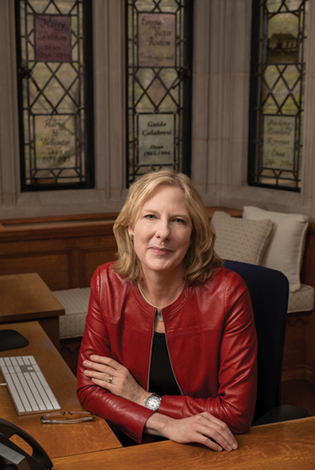
Harold Shapiro
Law School dean Heather Gerken says the rankings discourage important initiatives at the school.
View full image
Yale Law School will no longer participate in the U. S. News & World Report ranking of law schools, according to the dean, Heather Gerken. And Yale isn’t alone. Just hours after Gerken’s announcement on November 16, John Manning, dean of Harvard Law School, announced that Harvard Law would also stop participating in the rankings. The two were followed quickly by a raft of other law school deans whose schools are ranked in the top quartile. “We have been so encouraged by the positive response to our decision to withdraw from the U. S. News & World Report rankings,” says Gerken. “This decision was not about Yale Law School. It was about the future of legal education and our profession. This is a moment to step back and think hard about what we are doing.”
By early December, 16 law schools (out of 196 included in the rankings) had followed Yale’s lead, saying they would no longer submit data to U. S. News. Of those ranked in the top five, only University of Chicago Law School has said it will continue to participate. (A spokesperson for Yale Law says that despite the timing of the announcements, “our decision-making process was completely independent.”)
In a statement describing the U. S. News methodology as “profoundly flawed,” Gerken said the methods of U. S. News “disincentivize programs that support public interest careers, champion need-based aid, and welcome working-class students into the profession.” Though Yale has claimed the top spot in every U. S. News law school ranking since they were introduced 32 years ago, Gerken added that recent important initiatives “that make our law school a better place . . . perversely work to lower our scores.”
Among those initiatives: awarding public interest fellowships to students who want careers in that field, and encouraging students who are interested in pursuing master’s degrees and PhDs. “U. S. News appears to discount these invaluable opportunities to such an extent that these graduates are effectively classified as unemployed,” writes Gerken.
Gerken applauds the efforts U. S. News has made to acknowledge that debt can “deter excellent students from becoming lawyers and has tried to help by giving weight to a metric that rests on the average debt of graduating students and the percentage of students who graduate with debt.” But she adds that “a metric based on debt alone can backfire, incentivizing schools to admit students with the means to pay tuition over students with substantial financial need.” Finally, Gerken decries an overreliance on standardized test scores, a metric that she says discourages admissions officers from looking beyond scores for promising students.
U. S. News, in a statement to the Yale Alumni Magazine, says it will keep Yale Law in its law school rankings: “U. S. News will continue to rank all fully accredited law schools, regardless of whether schools agree to submit their data. The methodology for our rankings have evolved over the last 30 years and will continue to evolve to meet the needs of all students.”
 loading
loading